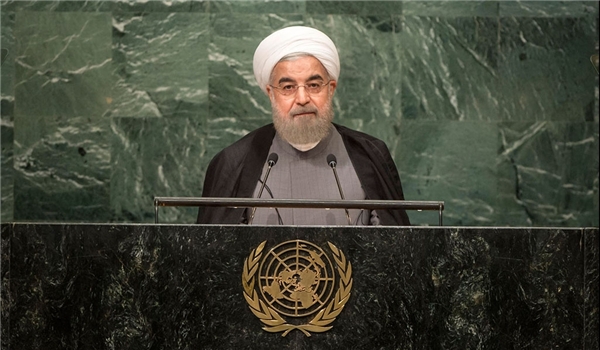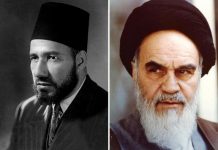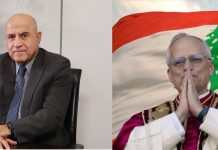Rouhani and the ‘As-If’ System
Amir Taheri/Asharq Al Awsat/May 26/17
In traditional clerical schools in Iran and Iraq, one of the skills that aspirant mullahs learn is known as “shabih-khani ”.
This is difficult to translate but, broadly speaking, it means “narrating as-if”. In other words, this is a primitive form of theater imitating life with a few broad strokes of words and images.
It was, therefore, no surprise that when the mullahs seized power in Iran in 1979 they dipped into their immense experience of “shabih-khani ” to create a political system, and a way of being, that imitates the real but is as far from reality as possible.
The “as-if” technique was first reflected in the name they chose for the regime they created: Islamic Republic of Iran. Now, anyone familiar with history and theology would know that there could be no republic in Islam. In a republic sovereignty belongs to the people, in Islam it belongs to God. In a republic laws are made and unmade by the public through elections and parliaments. In contrast, Islam is the realm of Divine Law which immutable for eternity, could never be changed and is at best, open to interpretation.
The “as-if” scenario also applies to including the name of Iran into the new regime’s triple identity. One problem is that Islam is a universal faith and cannot be confined to any particular national identity. Another problem is that Iran existed as a nation-state and a cultural space long before Islam appeared while Islam does not depend for its existence and success on Iran or any other particular country.
In other words, outside the ”as-if” exercise, the Khomeinist regime is neither a republic nor Islamic and, even more so, not even Iranian.
The mullahs also created an “as-if” parliament, a body that looks like a parliament and sounds like one but is miles away from a real legislature. Khomeini was obliged to include this pseudo-parliament in his scheme in order to hoodwink the Iranian middle classes who had dreamt of a Western-style parliamentary democracy since the 19th century.
But the most glaring example of the “as-if” gimmick is the election of a President of the Islamic Republic, an exercise that we witnessed earlier this month. Since the Khomeinist system isn’t a republic it is logical that it should have no president either. And, yet, such a position is included in the Constitution of the Khomeinist regime. Leaving aside “as-if” considerations, the position has nothing to do with the presidential function in any normal republic. The man who occupies it could, at best, be described as “Head of the Council of Ministers” or “First Minister.” Muhammad Khatami who played the role of president for eight years has described his position as that of a “logistics-man” whose task is to provide the wherewithal to implement policies set by the “Supreme Guide”.
To foment more confusion, the so-called “president” is allowed to have countless “assistants” (mu’awen). The trouble is that in their case the term “assistant to the president” is translated as “vice president”. This is why a foreign visitor is flattered when on arrival in Tehran he is greeted by an “as-if” “vice president” who, in reality, could be no more than a bag-carrier for the “as-if” president. Having said all that, one must give it to the mullahs: their “as-if” scheme has fooled many people inside and outside Iran. In the latest pseudo-election we saw some otherwise sane Iranians arguing about the necessity of voting for Hassan Rouhani, as “the bad candidate”, to prevent the election of Ibrahim Raisi, branded as “the worst candidate.”
This has also been the theme of several panels organized by the Tehran lobby in Washington and elsewhere to sell the idea that the re-election of “moderate, reformer” Rouhani promises a change of behavior by Iran.
The fact is that Rouhani is neither a moderate nor a reformer. He started his career as a member of the Islamic Majlis by introducing bill to have the hanging of regime opponents organized in public, preferably during Friday Prayer gatherings. He claims that his greatest “honor” is that he was the first mullah to refer as Imam to the late Ayatollah Khomeini.
Rouhani was also a member of a committee charged with purging the Iranian army of its best officers, a move that weakened Iran immensely on the eve of Saddam Hussein’s invasion in September 1980. A member of the security services from the start, Rouhani was deeply involved in almost all of the atrocities committed by the regime.
As for his description as “reformer”, in his first four-year term Rouhani did not suggest, let alone implement, a single reform in any walk of life. He says he wants reform, but does not say what it is precisely that he wants.
For all that, I believe everyone, including Rouhani, should be given the benefit of the doubt. Who knows, maybe age has mellowed him. Maybe he had his fill of revolutionary blood-letting and is seeking to burnish his historic image.
If Rouhani has truly changed we shall soon know. Even within his extremely limited powers he can still do quite a few things to ease the pressure on the Iranian people and reduce tension in the region. Even if he can’t do anything he can at least call for some things. For example, he could ask for a moratorium on executions which, in his first four years, reached the highest peak since the 1980s. He could also call for the release of political prisoners and prisoners of conscience who have already served their sentences but are still being held without fresh charges. He could publicly demand that those put under house-arrest without charge regain their full freedom.
Maybe because he is conscious of his limited powers, in his first message after the election, Rouhani promised to be “a good advocate for you, pleading you cause.”
On foreign policy, Rouhani could at least “plead” for the release of the 11 hostages from five countries, including some from the US and the UK. He may not be able to efface the “Death America” slogan that constitutes the cornerstone of Khomeinist fake ideology. But he could, at least, paint over the American flag on which he walks every day before entering his office. How could Rouhani feel if Donald Trump walked on an Iranian flag every day before entering the Oval Office?
Rouhani or any other “as-if” president cannot decide radical changes in the Khomeinist regime’s policies. But he can if he has the courage, at least, ask for change.






















